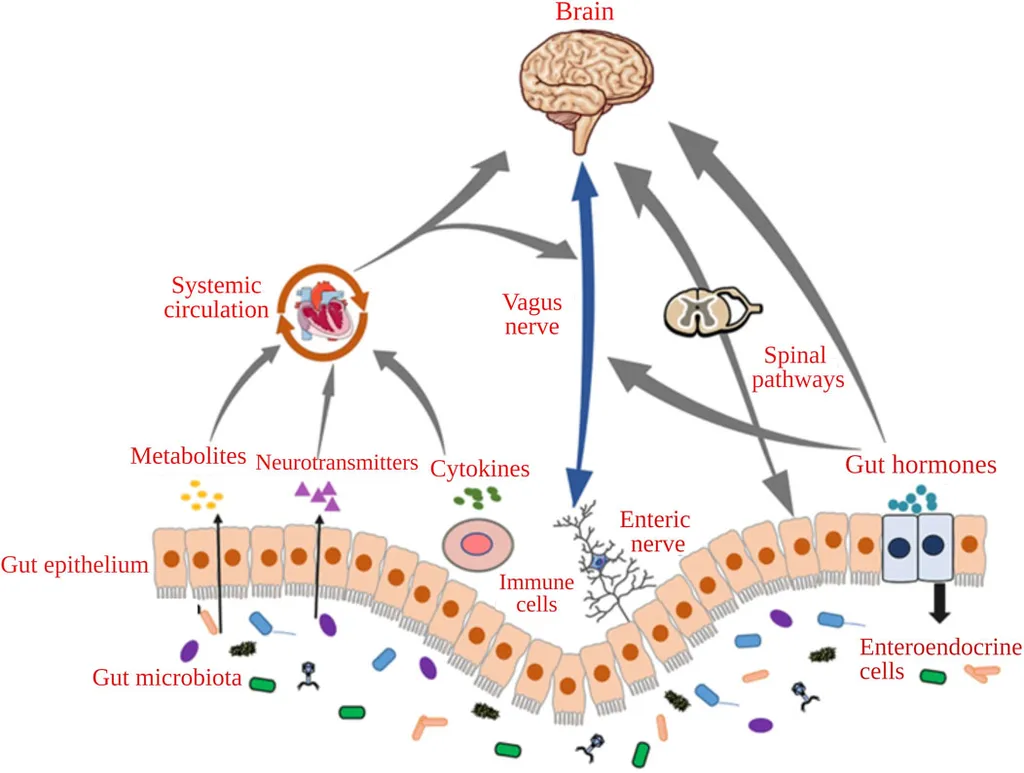In the intricate world of gut health and its far-reaching effects on the brain, a new narrative is unfolding, one that could reshape our understanding of dietary interventions and their potential to influence cognitive and emotional well-being. At the forefront of this exploration is Gizem Kezer, a researcher from the Department of Molecular Food Chemistry and Food Development at the Institute of Food and One Health, Gottfried Wilhelm Leibniz University in Hannover, Germany. Her recent work, published in the esteemed journal *Frontiers in Microbiology* (translated to English as “Frontiers in Microbiology”), sheds light on the profound impact of probiotics, prebiotics, and synbiotics on the gut-brain axis (GBA).
The gut-brain axis is a complex bidirectional communication system that connects the gastrointestinal tract and the central nervous system through various pathways. Emerging evidence suggests that dietary interventions can influence the composition and activity of the gut microbiota, thereby modulating GBA function. This modulation has been linked to potential benefits for cognitive performance, emotional regulation, and resilience against neurodegenerative and neuropsychiatric disorders.
Kezer’s comprehensive review synthesizes current clinical and preclinical evidence, highlighting the therapeutic potential of these dietary interventions. “Our findings indicate that probiotics, prebiotics, and synbiotics can have a significant impact on neurocognitive outcomes and systemic health,” Kezer explains. “However, the mechanisms underlying these effects and their long-term clinical relevance are still not fully understood.”
The implications of this research extend beyond individual health, potentially influencing the commercial landscape of the food and pharmaceutical industries. As consumers become more aware of the gut-brain connection, the demand for functional foods and supplements that support gut health is likely to rise. This could open up new avenues for product development and market growth, particularly in the realm of probiotics and synbiotics.
Moreover, the potential to manage chronic conditions such as inflammatory bowel disease, irritable bowel syndrome, and multiple sclerosis through dietary interventions could lead to significant cost savings in healthcare. By promoting immune homeostasis and overall well-being, these interventions could reduce the burden of chronic diseases on both individuals and healthcare systems.
Kezer’s work also underscores the need for further research to fully understand the mechanisms and long-term effects of these dietary interventions. “While the current evidence is promising, there are still many gaps that need to be filled,” Kezer notes. “Future studies should focus on elucidating the precise mechanisms by which these interventions influence the gut-brain axis and their long-term clinical relevance.”
As the scientific community continues to unravel the complexities of the gut-brain axis, the findings from Kezer’s research could pave the way for innovative therapies and interventions that harness the power of the gut microbiota to improve cognitive and emotional health. This could lead to a paradigm shift in how we approach mental health and neurodegenerative diseases, offering new hope for those affected by these conditions.
In the meantime, consumers and healthcare professionals alike can stay informed about the latest developments in this rapidly evolving field. By understanding the potential benefits and limitations of probiotics, prebiotics, and synbiotics, they can make informed decisions about their health and well-being. As Kezer’s research demonstrates, the gut-brain axis is a fascinating and complex system that holds immense promise for the future of health and medicine.

